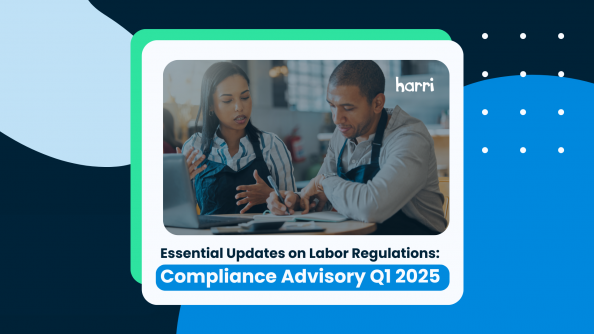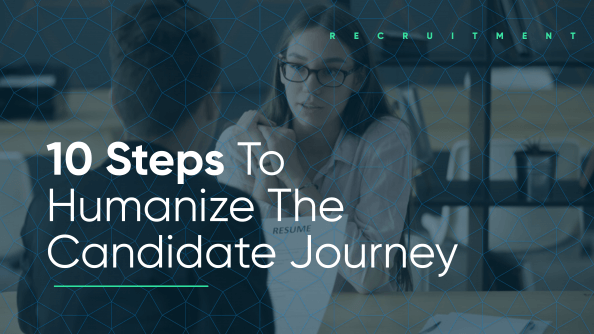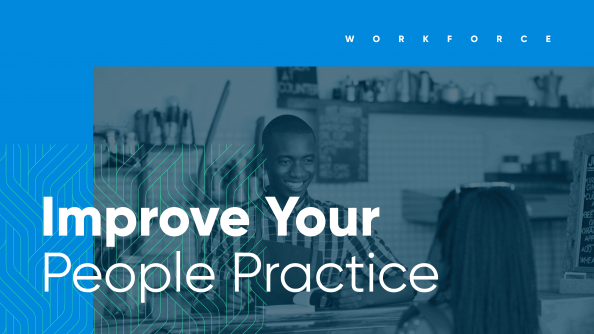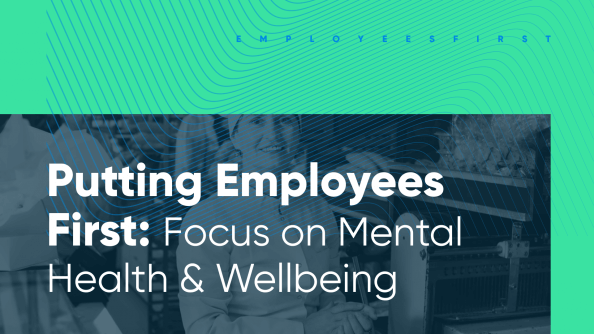What Talent Acquisition Processes Should You Automate?
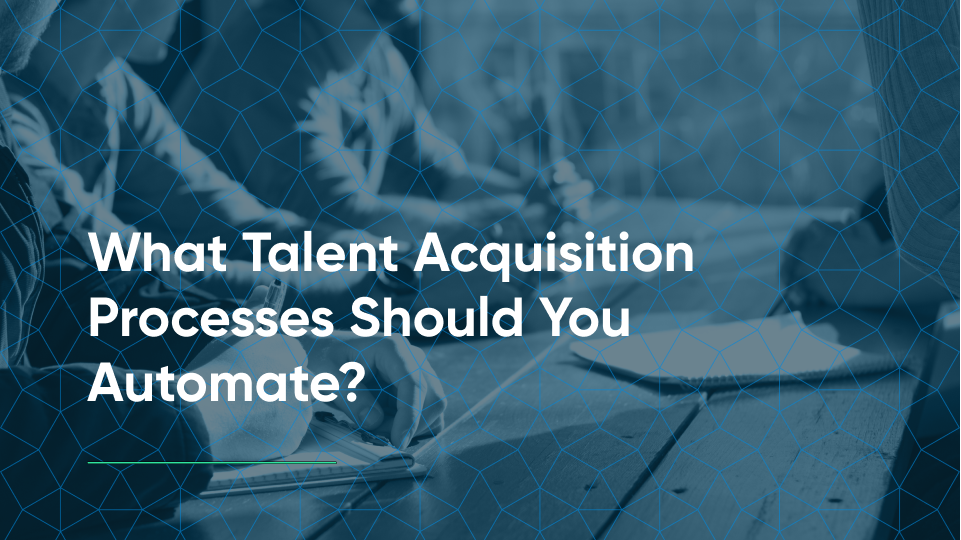
- By Harri Insider Team | April 13, 2021
Warmer weather is upon us and COVID-19 vaccine distribution numbers are growing by the day. The future looks bright for hospitality. As confidence returns to the industry, restaurant operators are preparing for a massive hiring boom to accommodate increasing service demands.
Some hospitality businesses are growing their HR teams in preparation, while others are taking a tech-based approach to talent acquisition and candidate management. Conversational AI, in particular, has caught the eye of many hospitality brands for its ability to enhance HR initiatives.
But in a service-driven industry like hospitality, businesses need a solution that can automate administrative HR tasks without dehumanizing the application and interview processes.
The concept of conversational AI is still fairly new to the hospitality industry, so hiring managers naturally may find themselves asking a few questions: What talent acquisition procedures should be automated utilizing conversational AI and what shouldn’t? Will automating talent acquisition feel depersonalized? Do candidates respond well to the use of automated talent acquisition procedures? The thoughtful application of hospitality-minded conversational AI can be a game-changer when applied correctly. Below we discuss the application of chatbots to automate talent acquisition processes, scale hiring efforts, and bring in high-quality candidates that want to stay with your business.
Automating talent acquisition with conversational AI
Harnessing conversational AI in the form of a chatbot should act as an extension of your HR team rather than a replacement. The right solution will save time and money by tackling the administrative tasks, freeing up your HR team’s time so they can focus on the human aspect of human resources.
Application screening to quickly find the right candidates
Although hospitality businesses can expect to receive a large quantity of applications, this does not necessarily equate to a high quality of applications. And while a higher number of applications increases the chances of finding best fits, someone still needs to manually sort through the resumes.
The extremely fast nature of hospitality hiring means that high-quality candidates will likely slip through the cracks. But with conversational AI, you can easily and automatically apply a filter as broad or as fine-tuned as your hiring requirements demand no matter how many applicants come in on a daily basis
Fine dining establishments may want to screen for basic wine knowledge before starting the interview process. Hospitality groups might want to check if an applicant has previously worked at an affiliated restaurant. Looking to fill a scheduling gap? Inquire a candidate’s scheduling availability and automatically move them into different hiring buckets based on their work time.
Quick culture assessments are another screening tool that can be automated with conversational AI to ensure great fits from the get-go. Ask prospective managers what are the top qualities they see in a high-performing team member, assess how a server would handle a difficult customer, or ask a candidate their definition of a successful workday. The opportunities are endless!
Using conversational AI reduces or (completely eliminates) the manual screening process, to accelerate the right candidates through your ATS — and it does so without any recruitment bias! By the time they reach your HR team, they’re already vetted, saving valuable time in the hiring process.
Schedule interviews between candidates and managers
Once you’ve screened candidates, the next step to getting fresh talent in your doors is coordinating interviews. And while it’s up to HR teams to coordinate interviews between hiring managers and candidates X, Y, and Z, playing messenger certainly is a time-consuming process.
But what happens when a scheduling conflict comes up? Or a candidate needs to switch to a video interview after being exposed to (but not sick with!) COVID-19? It’s up to the hiring manager to re-coordinate. But that takes time, is prone to errors, and can cause serious delays in the interview process.
Introducing a conversational AI platform allows candidates to schedule and reschedule interviews on their own time. Depending on your preferences, self-service scheduling can be available immediately after the chatbot screening process or can require a member of your HR team to approve candidates into the interview flow.
Are you hosting a hiring event or conducting group interviews? Your conversational assistant can handle it all. The whole process is completely customizable and frees up time for both your hiring teams and incoming applicants. And because conversational AI is scalable by nature, scheduling automation is a seamless task no matter how many locations, teams, and candidates are involved.
Most importantly, automated scheduling reduces application friction, significantly increasing the chances that candidates will progress along the interview process.
Automate administrative hiring tasks
Managing potential employee applications can often be a job in itself, especially for larger hospitality businesses. Any hiring manager knows that there’s a lot of paperwork involved with hiring a new employee.
When you finally make a new hire, you want to get them in the field and training on day one. New hire documentation and other legal paperwork can set employees back by at least a day, reducing hiring effectiveness.
Through the use of a conversational AI tool, hospitality HR teams can easily collect, upload, and store important candidate documents to ensure every candidate is ready to hit the ground running on day one.
From tax forms and employee agreements to good faith scheduling documentation, all back-and-forth wait periods associated with the hiring process can be completely handled in an automated environment. And if the candidate has a more detailed question? Your HR team only needs to step in when absolutely necessary.
Chatbot-based onboarding also has tangible benefits on the candidate side to ensure a smooth process.
A mistake as simple as a mistyped name from one form to the next can slow down the hiring process or ever set payroll back by a week. Remember, high levels of friction increase the odds of day one no-shows. As a candidate fills out their application, their name, birthday, job location, and other vital data is automatically filled out on corresponding documents. This significantly streamlines the arduous process of filling out legal documents and eliminates HR headaches by ensuring consistent compliance across all documentation.
Small-detail candidate engagement every step of the way
Hospitality candidate ghosting rates are extremely high starting with the beginning stages of the hiring process up until (at least) the first 30 days. This is an industry reality no matter the brand, position, or benefits.
Candidates need constant reminders of upcoming interviews, follow-up information, and next-step coordination to keep them engaged. If you’re not offering that, another company is. Yet for restaurant groups hiring multiple candidates each day, keeping track of all of these stages and communicating constant updates is extremely time-consuming on top of regular hiring duties. Candidates will fall through the cracks and turn into a no-show.
The good news is that, even though constant engagement is required for successful hiring, that communication can be incredibly simplistic. This is an excellent opportunity to implement conversational AI to ensure consistent candidate engagements.
Chatbots can send messages over SMS, email, or your candidate’s preferred communications channels to ensure a highly engaging process. Send interview reminders days, hours, or minutes before an interview, and pair those reminders with travel information or details on the interviewer. Nudge candidates on new hire documentation that needs to be completed. Thank a candidate for coming in for an interview and let them know you’ll be in touch within the next 24 hours.
And if a candidate has a question? Conversational AI can provide automatic logistics answers, be configured to answer more detailed questions, or can flag a team member when additional information is required.
All of these and more can be sent automatically as applicants progress through the hiring stages. Even better, conversational AI can personalize all of these communications to fit your brand’s messaging and position requirements — all while tailoring each message to fit each individual application.
The outcome? Candidates are engaged, have a sense of your company culture, and are more likely to see the hiring process out to the end. Hiring managers can provide additional guidance when needed but aren’t bogged down by additional communication requirements. Conversational AI creates a win/win scenario for all parties involved, all without dehumanizing the process.
It’s time to automate HR processes with conversational AI
The hospitality hiring boom hasn’t already fully hit us yet, and HR teams are already struggling to constantly engage new hires while maintaining existing staffing operations. Utilizing conversational AI enables meaningful engagements at scale without setting teams back.







